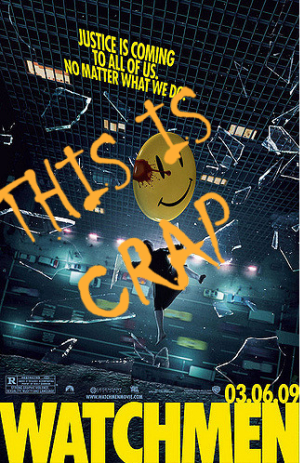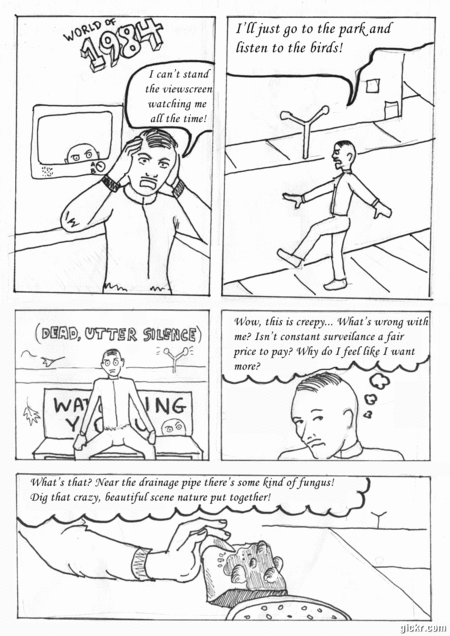
See other weird comics stories here!
Story One: The Strange Affair of The Sniffer
Story Two: Comics and Dreams
Story Three: Why Superhero Comics Bite
Story Four: Goony and Phil Motion Comic
Story Five: Who is The Crimebuster?
Story Six: What is the Future of Motion Comics?
Story Seven: What was the original cast of the Watchmen in 1986?
Story Eight: Oriental Rock and Boy Comics #31 Motion Comic
Story Nine: Mr. Pipps and the Wide-Awakes Comic
Story Ten: The Wingless Griffin, an Illustrated Story
What is the Future of Motion Comics?
I tirelessly probe the universe of comics, searching for the strange, the remarkable, and the combination of story and art that move the artform towards perfection. No comic can be ignored (except for a couple from Marvel and DC) because of the potential they hold.
I wanted to write a bit about motion comics, and their viability as a medium. It's been something I've thought about for a while, what comics will turn into in the 21st century. As you've no doubt noticed, actual comic book sales are continuing to decline; they are of primary interest to collectors, not kids. There has been some hopeful news from the east, where the comics made in Japan are of sufficiently high quality that children in the United States are willing to buy them. I don't know what the sales numbers are, but I'm seeing a lot more manga in bookstores than I am seeing regular comics. Not that I've been in a bookstore for a while, they've all closed down.

In related news, it does appear that we are inching towards a paperless society. How long? I don't know; I'd guess 30 years, but it could be as many as 100. It's easier to put stuff onto your smart phone and carry your entire library with you than it is to store large amounts of bound paper leaves. That's the driving force. Yes, personally I like paper more because the resolution cannot be matched. Perhaps in the future we will have monitors and smartphones with pixels invisible to the naked eye, and there won't be a discernable difference between the resolution of a screen and a piece of printed paper.
Suppose that's true: then where does this leave comic artists? I work, and I think, on panels arranged on a page, in a book of 24 or so leaves. The paper will be vanishing, though, so we'll be reading these comics on the web. In what form will they survive? As we know there are a tonne of web comics now; of very varying quality, from absolutely terrible, to terrible, to kinda bad (with perhaps 1 out of 1,000 being good), but they're around, and they're not going away. I don't know what the cumulative readership is, but for right now, the web comic uses the page as its primary template. Heck, mine does.
Of interest to comic artists is getting more people to read comics. The more readers, the more money they have to spend. In 2017, and as has been the case since about 1955, comics have been regarded as a shallow, immature medium. Occasionally some comics will be well-made, or cover some topic that is well-known and which flatters modern sensibilities enough (WWII, slavery, etc) that the comic will receive the praise of "serious" critics. Most of the time, though, comics are derided as being fit for little kids, perverts, and degenerates. Well... yeah I guess that's too bad.

The comic art form, like it or not, is only about 100 years old, and we're going to undeservedly get shit from stupid people who don't get it because of the youth of our art form. That's how it is. For example, I don't know what kind of shit oil painters got in the fifteenth century when the medium started, but maybe people made fun of them and said that oil paintings were for little kids.

Side note: as Kim Deitch pointed out, the art form of comics and movies started at about the same time. Movies have budgets in the hundreds of millions. Comics artists are plumb lucky when they get a print run of 10,000. That's how it is. Movies (and television) derisively present comics as an inferior, shallow medium fit for degenerates, perverts, and little kids. Yeah, as if movies are so great. Check out My Magic Dog and then, using only that example, explain to me how movies are the premiere art form of the 20th century.
Anyway, that's how the ball bounces. Most people think comics are stupid.
And so now there's been a slight ripple in the omniverse, and some small amount of people are starting to suggest that "motion comics" might be the thing that comics become. That "motion comics" might be able to entice people to read comics.
No. That's not happening.

I've read a bunch of motion comics, or "seen" them, as it were, and I don't think they work. The experience of watching a movie is different from the experience of reading a comic. Movies are passive; they last for an hour or two and you are stuck there watching them until they are over. You can pause the movie, but your options are slowing the movie down or speeding it up and then that will make the soundtrack sound crappy.
Comics are active. You pick it up and read it, panel by panel. You linger over certain lines or phrases or arrangements. You go back a page and read it again to see if you missed something referred to later. You put the comic down and do something else then you come back to it and you read it at exactly your own pace, the speed you most enjoy.
Okay, motion comics are, right now, an attempt to use the grammar of comics inside a movie, and it just doesn't work. Be honest. You've got panels and static art floating around. Sometimes you've got a soundtrack. THe viewer is stuck there, watching your motion comic on youtube.
So tell me: Why are there panels floating around? How do the panels floating around with static art help you tell your story in a more convincing way? Why wouldn't your youtube viewer switch and find some anime to watch instead? In an anime, things are moving around; an anime is like a movie, where you watch people moving around. Movies have never, ever attempted to appropriate the grammar of comics into their medium; I think this is because the grammar of comics doesn't work in a movie. When you read a comic and go from panel to panel, you are imagining what's happening in between each panel. Movies can't let that happen; the action is constantly progressing and there's no time to imagine.
Any time you try to make a motion comic, you're making an animated movie that tries to tell a story with a grammar that is adapted for a different medium. Movies have their own grammar; why are you abandoning this grammar to use a storytelling mode that is filled with flaws? What do you want to do, make the viewer think he's reading a comic? Why wouldn't he go read a comic, then?

I checked what Scott McCloud had to say, and he made a good point; he called the Motion Comic version of The Watchmen a "fully animated monstrosity". (Note: That wasn't the point I was going to call out, specifically but I thought it was a pithy thing to say. I tried watching the Motion Comic version of The Watchmen. Having read the book, and seen the movie, I found I had no interest in the motion comic and gave up after five minutes. How could their animation best my imagination? Answer: they could not.)
So here's Scott McCloud's good point:
...looping animation (and sound, for that matter) still communicate a static span of time. If panel 2 clearly comes after panel 1 and before panel 3, it still feels like comics, even if panel 2 is a short loop of some sort.
I gotta agree with this. I don't like agreeing with it; because it means that comics of the future are never gonna get on the YouTubes. The youtubes show a video; and the comic, even the comic with a looping animation in one of the panels, is not ... well I have a failure of imagination, and I cannot "see" how something like the below (which is a GIF comic by me, Sam Battin) can get onto the youtubes:

Okay... well, so what does that leave us with? We can't do "motion comics" because they're always going to be a stunted artform that is animation but tries (and fails) to use the grammar of a static artform.
That leaves us with the other idea that McCloud had, about how the web interface can give comic artists the dream of having an infinite canvas. He used Trajan's Column as an example of comics; on that column, it tells a story in 155 scenes about the Dacian War (whatever that was). Okay, yes, that is pretty cool, I guess kinda.

But okay suppose you do have technically an infinite canvas; what can you do with it? Yes, technically, now all the panels in the comic you write can be arranged in a vast shape, such as a circle, or a triangle, or whatever. They don't have to conform to the concept of the page.
Well... speaking as a web developer, I'd say most computers and webservers don't have enough resources to deliver the infinite canvas at this time. It'd take some doing to give us the 155 scenes in Trajan's column and also display them as a series of panels on an upward-rotating column.
Paper has powered our civiliztion for thousands of years, and it will be (I think) probably at least another lifetime, if not more, before we abandon paper for pixels.
I mean, the Model T automobile came out in 1908. Surely, that heralded the end of the horse in favor of the gas-powered auto, yet about 2 million or so horses were killed during service in WWII. More than 100 years after the Model T came out, horses are primarily a novelty item in America in the early 21st century (although elephants are still pressed into duty in Thailand. I mean, come on, Thailand, can you learn how to use bulldozers and trucks, for crying out loud?). The many examples of slow un-adoption of older, less-efficient technologies tells me that it'll be a long time before we completely un-adopt paper (and paper concepts (such as presenting a comic as a series of about five or six panels on a larger rectangle)).
Final word:
- motion comics are stupid becuase comics aren't animation. Quit doing them, or get much much better at doing them.
- Individual panels can have looping animations, and that's okay.
- The jury is still out on the utility of the "infinite canvas" concept for comics.
- There isn't an immense hurry to develop a new form for comics to take on the internet.
- Most people are stupid and don't "get" comics. No mater how good comics are, journalists will still begin articles with "BIFF! POW! ZAP!"
- There will be no "killer app" format for internet comics that will catch like wildfire and make it so that any comics artist can easily make a living at doing comics (pity).
